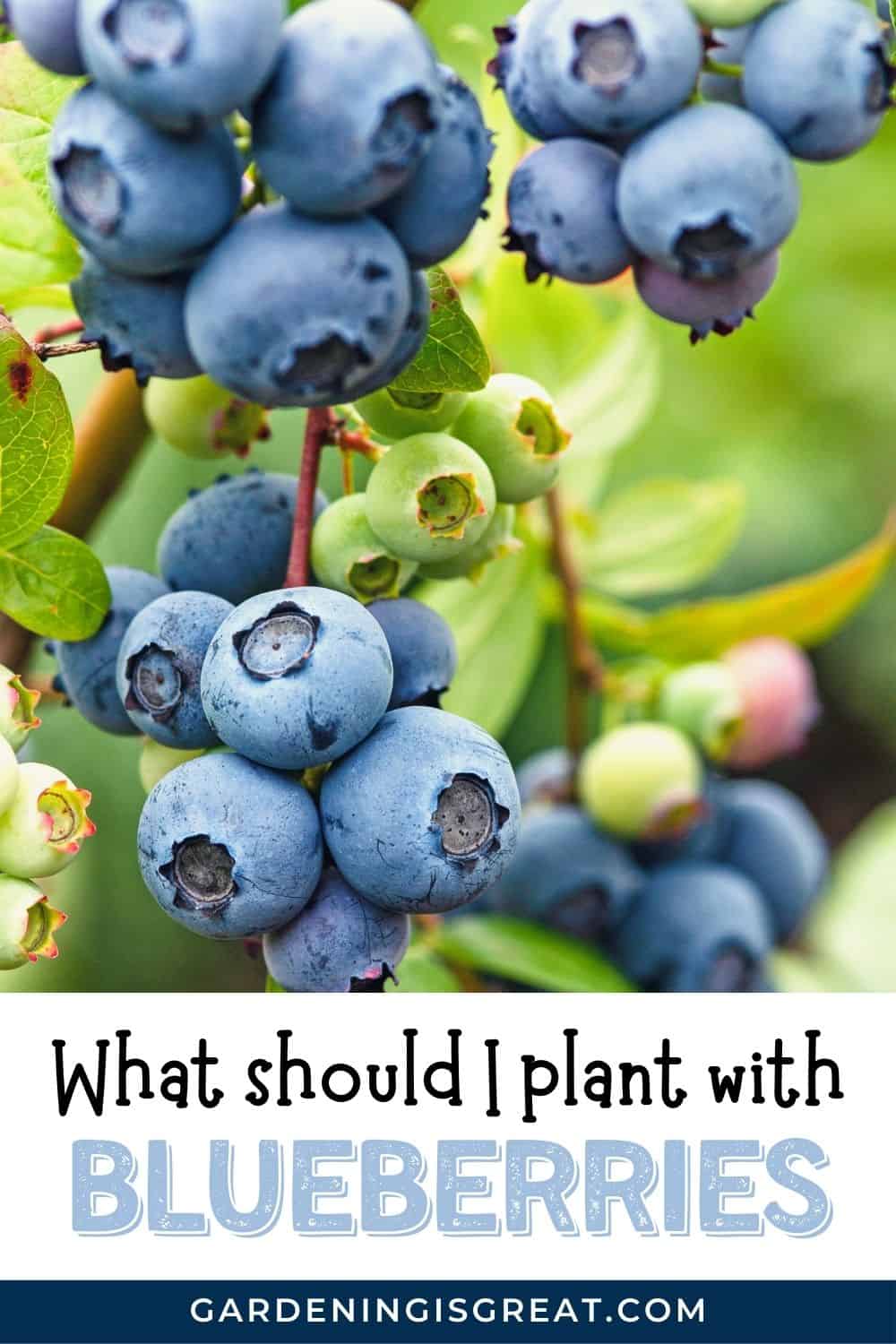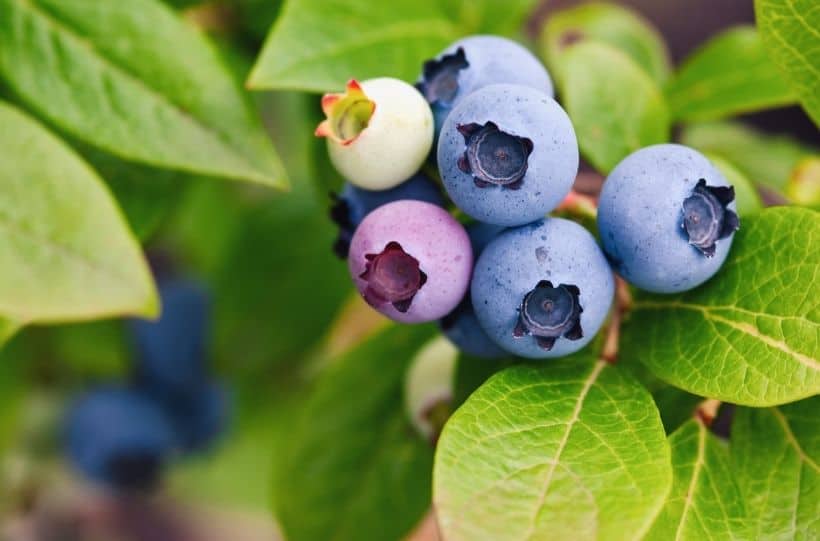7 Ideal Companion Plants For Blueberries
Blueberries are a delicious berry bush many gardeners love to grow from home. There is nothing quite like picking your very own berries to make into jams and pies straight from your garden.
Blueberries however have quite specific conditions they require to grow well. This can make it tricky for you to know what companion plants you can add around your blueberries.
Here we have compiled a list of 7 companion plants for blueberries that either benefit your blueberry bushes or, help to fill your garden space around the blueberries without having a negative impact.

Ideal Growing Conditions For Blueberries
Blueberry bushes are quite particular about what they need in order to thrive.
They require a sunny location without much shade and a lot of space as they grow up to 5-6 feet tall and up to 12 feet wide, depending upon the variety.
Blueberries grow best in acidic soil with a pH of between 4.5 and 5.5. Any higher and your blueberries will not thrive.
With these conditions in mind, careful planning of what plants to grow near and around your blueberry bushes are important. They need to also be plants that prefer acidic soil and can grow within partial shade provided by your blueberry plants.
7 Companion Plants For Blueberries
Selecting companion plants for blueberries are ideal if they:
- Can grow in acidic soil
- Provide ground cover for the blueberry plant’s roots
- Attract pollinators essential for blueberry bushes to produce fruit
- Add nutrients to the ground.
Grasses and Grains
Grasses and grains are known as cover crops and are essentially used to help prepare the soil for the following growing season.
These crops not only help to protect the soil during winter from soil erosion but also ensure that the nutrients are not leached.
Certain grasses and grains also help to add nutrients such as nitrogen, ensuring the soil is in a prime condition for your crops the following spring.
It is important to plant these crops after your fruits and vegetables have been harvested and before the first frost. They then can be removed from the ground and composted when you are ready to plant the next season’s crops.
Columbine
Columbines are a beautiful, low-growing perennial plant that offers pink, white, blue, red, and purple flowers.
They are low maintenance and ideal for growing in amongst your blueberry bushes.
This companion plant helps to protect the roots of your blueberry plants with ground cover. But, it also attracts pollinators to your blueberries.
As columbines flower at the same time as your blueberry plants, the bright flowers attract bees and butterflies to your garden, who will, in turn, pollinate your blueberry flowers.
Lilac
Lilac bushes are incredibly popular with pollinators. Just like columbines, lilac makes a great companion plant for blueberries as it flowers at the same time, helping to attract pollinators.
However, keep in mind that lilac bushes can grow up to 15 feet tall, which could block out the sunlight from your blueberry bushes if allowed to grow this high.
If you want to use lilac as a companion plant for your blueberries, consider planting a dwarf variety and maintain it regularly so that it does not compete for space and resources with your blueberry plants.
Rhododendron
Rhododendrons complement blueberry bushes well when planted together. They grow well in full sunshine and acidic soil just like blueberries. Plus, with their gorgeous display of flowers in a range of colors, they offer your garden an array of blooming flowers whilst your blueberries develop.
Rhododendrons are most often used as companion plants for blueberries due to their coverage of the soil. Blueberry roots are very sensitive to the heat and by planting rhododendrons with your blueberry plants, they help offer shade, particularly during the summer months.
Similar to lilacs, rhododendrons can grow up to 8 feet tall, competing with your blueberry plants if left unmaintained. Remember to trim your rhododendrons regularly so that they don’t block the sunlight.
Basil
Basil is a relatively durable herb that can grow well in acidic soil. As it only grows to around 2 feet tall, it doesn’t compete for resources with your blueberry plants and can act as a great companion plant.
As basil grows low to the ground, it provides essential ground cover for your blueberry plant’s roots. This helps to protect the soil around the roots from heavy rain and the roots from the summer heat.
Thyme
Unlike basil, thyme is a flowering herb that blooms in early summer. Along with the scent of the herbs, the small, purple flowers help to attract pollinators to your blueberry plants when planted together.
As blueberry bushes bloom between spring and early summer, planting thyme with your blueberry plants will help attract pollinators to fertilize your blueberry flowers.
Azaleas
Azaleas are very similar to rhododendrons with bushes full of large, beautiful flowers that bloom during summer. They grow well alongside blueberries as they naturally prefer acidic soil.
Where rhododendrons require lots of maintenance to ensure they do not compete with your growing blueberry plants, azaleas grow to a maximum of 150cm tall. It is best to trim them slightly after they have finished blooming, not only to encourage new growth the following season but also to lower their height and provide more direct sunlight to your blueberry plants.
What Not To Plant With Blueberries
Just as certain companion plants grow well alongside blueberry plants, there are certain plants you should avoid planting with blueberries.
These plants will either:
- Not grow well in acidic soil
- Competes for space and resources with your blueberry plants
- Shade your blueberry bushes.
Avoid growing the following types of plants in and around your blueberry bushes:
- Beans and peas
- Greens
- Melons
- Nightshades such as peppers, potatoes, and tomatoes
- Brassicas such as kale, cabbage, broccoli, and cauliflower
- Herbs such as oregano, tarragon, and sage.

Following this guide of companion plants for blueberries will help you to maximize the available planting space within your garden without causing harm to your crops. Using companion plants can be a great way to support, improve and increase your harvest.
For more top tips on companion planting, take a look at the following posts:
